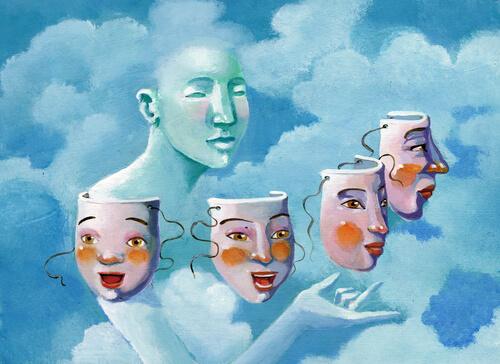Normopathy: The Unhealthy Desire to Be Like Everyone Else


Written and verified by the psychologist Valeria Sabater
We’re not templates. It’s not our duty to be like those around us, to dissolve as sugar poured into coffee. Our individuality makes us unique and valuable. However, nowadays we’re witnessing, and sometimes being victims of, something called normopathy. It’s that almost obsessive need to be like everyone else.
This isn’t a new phenomenon. In fact, it’s been going around for quite a while. However, writers and psychoanalysts like Christopher Bollas point out that technology is changing the way we think and even our personality. What we see on our phone or computer screen has suddenly an immense and overflowing power over us.
Normopathy warns us of a very concrete aspect. There are plenty of normopaths living among us. They’re people who aren’t sure of their own identity, who haven’t worked on getting to know themselves. Basically, their life goal is to obtain social validation.
They want to put their individuality on the back-burner so they can fit into what’s “normal”. Thus, mimicking what people do, say, or think on social networks leads them to psychological balance and tranquility.
We dare to say that their biggest fear is being abnormal. Not being able to fit in that invented and impossible mold is extremely worrisome for them. Moreover, every normopath feels melancholic and empty.

Normopathy is unhealthy
We want others to think we’re special and unique. However, we often like being like other people and fit into what’s “normal” and expected. In this regard, if we choose to have a voice of our own and act according to our wishes and motivations, people start pointing their fingers at us.
Albert Ellis, the famous cognitive psychotherapist, used to say that the key to happiness lies in learning to be ourselves in a world that’s almost always unfair. Whether we want to or not, we’re forced to deal with criticism, difficulties, and injustice.
However, normopaths don’t deal with anything. They only imitate, obey, and give in. Normopathy is extremely passive, which leads normopaths to validate and accept illogical acts. Dr. Christopher Bollas talks about the case of a young man who attempted suicide only because he wasn’t as good at football as his friends were.
How to define a normopath
Psychoanalyst Joyce McDougall, one of the most important specialists in the field of childhood schizophrenia, was the one to coin the term “normopathy”. In her book, Plea for a Measure of Abnormality, she used this word to define the fear of individuality.
- Normopaths are people who have an ongoing craving for social approval. This intense desire makes them set aside their own identity and even their dignity.
- Almost without realizing it, they end up creating a false self. They’re only focused on the outside world and live their lives glued to what happens around them. This includes their friends, community, and social media, among other things.
- Howard Gardner and Katie Davis carried out a study where they pointed out that some young people make use of what they’ve defined as “app mentality“.
- Some teenagers navigate their lives in the same way as they navigate their applications: with only a few options, using the same tools that others use and avoiding unexpected risks.
- Normopathy translates into suffering. More often than not, normopaths feel lost and empty. They’re completely unattached to the emotional world, meaning they don’t know how to cope with frustration, disappointment, or failure.
- Their “app mentality” doesn’t allow them to reflect on life. They’re completely unaware of how to open the door to their inner self. They’ve never explored who they are as a person.

What can we do about normopathy?
Exercising individuality is the key to curing normopathy. A normopath is an individual who denies their inner life to devote themselves exclusively to exercising senseless imitation until they finally become a superficial and empty object. This leads to suffering and dissatisfaction.
When a normopath finally realizes they’re suffering, they’ll feel obligated to ask for help and start that self-discovery journey where they can work on their self-esteem and individuality. That’s when the individual will finally cut the umbilical cord and be able to live life as they wish. They’ll finally understand that there’s nothing as abnormal as obsessing about being normal.
We’re not templates. It’s not our duty to be like those around us, to dissolve as sugar poured into coffee. Our individuality makes us unique and valuable. However, nowadays we’re witnessing, and sometimes being victims of, something called normopathy. It’s that almost obsessive need to be like everyone else.
This isn’t a new phenomenon. In fact, it’s been going around for quite a while. However, writers and psychoanalysts like Christopher Bollas point out that technology is changing the way we think and even our personality. What we see on our phone or computer screen has suddenly an immense and overflowing power over us.
Normopathy warns us of a very concrete aspect. There are plenty of normopaths living among us. They’re people who aren’t sure of their own identity, who haven’t worked on getting to know themselves. Basically, their life goal is to obtain social validation.
They want to put their individuality on the back-burner so they can fit into what’s “normal”. Thus, mimicking what people do, say, or think on social networks leads them to psychological balance and tranquility.
We dare to say that their biggest fear is being abnormal. Not being able to fit in that invented and impossible mold is extremely worrisome for them. Moreover, every normopath feels melancholic and empty.

Normopathy is unhealthy
We want others to think we’re special and unique. However, we often like being like other people and fit into what’s “normal” and expected. In this regard, if we choose to have a voice of our own and act according to our wishes and motivations, people start pointing their fingers at us.
Albert Ellis, the famous cognitive psychotherapist, used to say that the key to happiness lies in learning to be ourselves in a world that’s almost always unfair. Whether we want to or not, we’re forced to deal with criticism, difficulties, and injustice.
However, normopaths don’t deal with anything. They only imitate, obey, and give in. Normopathy is extremely passive, which leads normopaths to validate and accept illogical acts. Dr. Christopher Bollas talks about the case of a young man who attempted suicide only because he wasn’t as good at football as his friends were.
How to define a normopath
Psychoanalyst Joyce McDougall, one of the most important specialists in the field of childhood schizophrenia, was the one to coin the term “normopathy”. In her book, Plea for a Measure of Abnormality, she used this word to define the fear of individuality.
- Normopaths are people who have an ongoing craving for social approval. This intense desire makes them set aside their own identity and even their dignity.
- Almost without realizing it, they end up creating a false self. They’re only focused on the outside world and live their lives glued to what happens around them. This includes their friends, community, and social media, among other things.
- Howard Gardner and Katie Davis carried out a study where they pointed out that some young people make use of what they’ve defined as “app mentality“.
- Some teenagers navigate their lives in the same way as they navigate their applications: with only a few options, using the same tools that others use and avoiding unexpected risks.
- Normopathy translates into suffering. More often than not, normopaths feel lost and empty. They’re completely unattached to the emotional world, meaning they don’t know how to cope with frustration, disappointment, or failure.
- Their “app mentality” doesn’t allow them to reflect on life. They’re completely unaware of how to open the door to their inner self. They’ve never explored who they are as a person.

What can we do about normopathy?
Exercising individuality is the key to curing normopathy. A normopath is an individual who denies their inner life to devote themselves exclusively to exercising senseless imitation until they finally become a superficial and empty object. This leads to suffering and dissatisfaction.
When a normopath finally realizes they’re suffering, they’ll feel obligated to ask for help and start that self-discovery journey where they can work on their self-esteem and individuality. That’s when the individual will finally cut the umbilical cord and be able to live life as they wish. They’ll finally understand that there’s nothing as abnormal as obsessing about being normal.
All cited sources were thoroughly reviewed by our team to ensure their quality, reliability, currency, and validity. The bibliography of this article was considered reliable and of academic or scientific accuracy.
- Bollas, Christopher. (2018). Meaning and Melancholia: Life in the Age of Bewilderment. New York and London: Routledge.
This text is provided for informational purposes only and does not replace consultation with a professional. If in doubt, consult your specialist.







